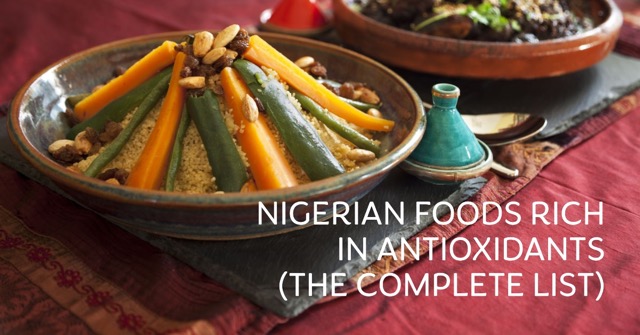Searching for Nigerian foods rich in antioxidants?
Then you're on the right page. You see...
Nigeria is home to many delicious fruits, vegetables, nuts, and spices that are chock full of healthy antioxidants.
And in this post you'll discover many of these Nigerian foods high in antioxidants.
Let get to them right away:

Nigerian Antioxidant-Rich Foods List
Here are 12 antioxidant-rich Foods you can find in Nigeria:
1. Beans
Beans like black beans, kidney beans, and chickpeas are an inexpensive source of antioxidants. Just a 1 cup serving provides over 9000 antioxidants! (1)
Beans are also:
- High in fiber to help you feel full and promote good digestion
- Full of protein to build muscle
- Packed with minerals like iron, magnesium, and potassium
Some compounds in beans called flavonoids act as antioxidants in the body. Beans also contain kaempferol, a flavonoid that has been linked to reduced inflammation and lower risk of cancer.
"A diet high in plant foods like beans appears to decrease risk of obesity, diabetes, heart disease and overall mortality."
2. Strawberries
These sweet, red berries are brimming with vitamin C and antioxidants. One cup of strawberries gives you:
The antioxidants in strawberries called anthocyanins give them their red color. Studies show anthocyanins:
- Reduce inflammation
- Lower risk of heart disease
- Improve blood pressure and cholesterol
Strawberries are easy to enjoy fresh or add to smoothies and salads.
3. Raspberries
Raspberries contain antioxidants called ellagitannins which may:
- Fight cancer cells in the lab
- Lower risk of cancer in studies on animals (3).
Other antioxidants in raspberries like anthocyanins are linked to (4, 5, 6):
- Less inflammation in the body
- HDL cholesterol (the "good" kind)
- Blood pressure
These antioxidants give raspberries their rich, red color. Try adding fresh or frozen raspberries to yogurt, oatmeal or desserts.
4. Blueberries
Blueberries are antioxidant superstars! They contain the most antioxidants per serving compared to other common fruits and veggies (7, 8).
The antioxidants in blueberries called flavonoids may:
Studies also show blueberries improve memory and focus in kids and adults.
Try sprinkling fresh or frozen blueberries on cereal, pancakes or in smoothies.
5. Sundried Tomatoes
Sundried tomatoes are packed with the antioxidant lycopene, which gives them their rich, red color.
Lycopene may help:
- Fight cancer cells in the lab
- Lower risk of prostate, lung, stomach, and colon cancers
- Protect skin from sun damage
Sundried tomatoes contain over 10 times more lycopene than fresh tomatoes!
Try adding sundried tomatoes to salads, pastas, and sandwiches. Or snack on them plain for an antioxidant boost!
6. Orange Bell Peppers
Orange bell peppers provide plenty of vitamin C and beta-carotene, two antioxidants that:
- Boost immunity
- Reduce risk of heart disease and cancer
- Protect eye health
One large orange pepper has over 2 times the vitamin C of an orange!
Beta-carotene gives orange veggies their color. It converts to vitamin A in the body, which keeps eyes and skin healthy.
Add roasted red peppers to kabobs, pizzas, omelets and pasta dishes.
7. Red Cabbage
This colorful veggie offers a hearty dose of antioxidants called anthocyanins, which give red cabbage its purple hue.
Studies suggest anthocyanins may:
- Reduce heart disease risk
- Prevent certain cancers
- Boost brain function
One cup of raw red cabbage has more than 20 mg of anthocyanins (11). It's also packed with vitamin C.
Try shredding red cabbage for coleslaws or enjoy it roasted, sauteed or grilled.
8. Ugu & Dark Leafy Greens
Ugu and other dark leafy greens like spinach, Waterleaf and bitterleaf contain antioxidants called carotenoids:
- Lutein protects eyes from sun damage
- Zeaxanthin filters blue light and promotes eye health (12, 13, 14).
These greens also provide vitamins C, E and A, all antioxidants.
Just one cup of raw spinach gives over 2000% of your daily vitamin K plus plenty of folate, iron, magnesium and calcium.
Add spinach to omelets, smoothies, soups, salads and sandwiches for an antioxidant and nutrient boost!
9. Cauliflower
While not as colorful and popular as some veggies, cauliflower is filled with important antioxidants:
- Lutein - protects eyes
- Zeaxanthin - filters blue light
- Vitamin C - lowers heart disease risk
Cauliflower also contains sulforaphane, a compound linked to:
- Fighting cancer cells
- Reduced risk of prostate and colon cancers
Roast cauliflower florets as a tasty, antioxidant-rich side dish or add to soups and stir-fries.
10. Plums
These small, sweet stone fruits are brimming with vitamin C and antioxidants called phenolic compounds that may:
- Boost bone density
- Reduce inflammation
- Enhance brain function
Studies show plums can lower risk of obesity, diabetes, and heart disease (12).
Enjoy plums fresh, baked into desserts, grilled or added to yogurt. Their antioxidants and nutrients will give your body an extra boost!
11. Walnuts
Walnuts are one of the best plant sources of omega-3 fatty acids, which have powerful anti-inflammatory effects in the body.
They also provide antioxidants like:
- Vitamin E - protects cells from damage
- Melatonin - may prevent certain cancers
Just 1 ounce of walnuts offers 20% of your daily vitamin E and 1000 antioxidants!
Add walnuts to oatmeal, salads or snacks for a nutrition and antioxidant punch.
12. Sesame Seeds
Tiny sesame seeds are bursting with antioxidants like vitamin E, phytosterols, and lignans.
Studies show sesame seeds may help:
- Lower blood pressure
- Reduce inflammation
- Improve blood sugar levels
Sesame seeds add crunch and nutty flavor to stir fries, salads, and breads. Try making your own homemade hummus with sesame seeds!
13. Flaxseeds
Flaxseeds provide a trio of antioxidants:
- Lignans - plant compounds that may drop cancer risk
- ALA omega-3s - reduce inflammation
- Fiber - promotes good digestion
Flax also contains vitamin E and manganese which act as antioxidants.
Studies show flaxseeds may help:
- Blood pressure, cholesterol, blood sugar
- Improve memory and mood
Sprinkle ground flax on cereal, yogurt or salads.
"Eating flaxseeds regularly may help prevent and manage numerous chronic diseases."
14. Beets
Beets get their rich, purple color from antioxidants called betalains.
Research shows betalains may (13, 14, 15):
- Fight cancer cells in the lab
- Risk of colon and stomach cancers
- Protect against heart disease
- Improve blood flow
Beets also contain:
- Iron - prevents anemia
- Folate - boosts heart health
- Vitamin C - sharpens mind
Roasted or cooked beets make a tasty, antioxidant-packed side dish!
15. Spices and Herbs
Herbs and spices like cinnamon, oregano, cloves and mint are antioxidant superstars!
For example:
- 1 teaspoon of cinnamon has as many antioxidants as 1⁄2 cup of blueberries!
- 1 teaspoon of oregano has the same antioxidants as 3 cups of spinach!
Spices with the most antioxidants:
| Spice | Antioxidants per Teaspoon |
|---|---|
| Clove | 7207 |
| Cinnamon | 6668 |
| Oregano | 4525 |
| Basil | 2252 |
Add spices liberally to dishes for extra antioxidant power!
16. Dark Chocolate
Indulge in the healthy antioxidants of dark chocolate!
The higher the cocoa content, the more antioxidants dark chocolate contains (16).
Dark chocolate's flavonoids may:
- Blood pressure
- HDL cholesterol (the good kind!)
- Risk of stroke
Aim for chocolate with at least 70% cocoa and no added sugar.
A little square each day can give your body and mind a boost!
17. Green Tea
The antioxidants in green tea called EGCG may help:
- Burn fat
- Risk of dementia
- Protect the brain from aging
- Fight cancer cells in lab studies
Drinking green tea may also:
- Blood pressure
- HDL cholesterol
- Heart disease risk
Brew hot or cold green tea to sip throughout the day for an antioxidant lift.
18. Coffee
Coffee beans contain antioxidant compounds like chlorogenic acid and melanoidins.
In studies, coffee drinkers have:
- Risk of liver and colon cancers
- Risk of type 2 diabetes
- Risk of heart disease and stroke
Maximize antioxidants by drinking freshly brewed coffee. Decaf also provides benefits.
Aim for 1-2 cups a day to get an antioxidant boost without overdoing the caffeine!
What Are Antioxidants and How Do They Work?
Antioxidants are compounds that help protect your cells from damage caused by unstable molecules called free radicals.
When your body digests food and is exposed to things like pollution or radiation, it makes free radicals. Free radicals are missing an electron and want to take electrons from other molecules. This makes the molecule they took the electron from become a free radical!
This starts a chain reaction of molecules stealing electrons from each other. This chain reaction is called oxidative stress. Oxidative stress can damage cells and lead to disease.
"Oxidative stress is thought to play a role in many chronic diseases, including cancer, heart disease, diabetes, Alzheimer’s disease, Parkinson’s disease and eye diseases."
Some examples of antioxidants are:
- Vitamin C
- Vitamin E
- Beta-carotene
- Lycopene
- Lutein
- Anthocyanins
- Resveratrol
- Flavonoids
Antioxidants stop the game of electron tag by giving an electron to a free radical without becoming a free radical themselves. This stops the chain reaction.
How Antioxidants Work:
- Free radical takes electron from molecule
- Molecule missing electron becomes free radical
- Antioxidant gives electron to free radical
- Chain reaction stops!
Antioxidants are like the referee blowing the whistle on the electron stealing game. They stop the damage before it gets out of hand.
Eating lots of fruits, vegetables, herbs, spices, nuts and tea gives your body more antioxidants to stop free radicals. A diet high in antioxidants may help prevent certain diseases by reducing oxidative stress.
Some studies show that getting more antioxidants lowers the risk of:
- Heart disease
- Certain cancers
- Vision problems
- Cognitive decline
- Parkinson's disease
So load up on antioxidant-rich foods! Your body will thank you.
Conclusion on Nigerian Foods Rich In Antioxidants
Antioxidants are important compounds found naturally in many foods. They help stop cell damage by neutralizing harmful free radicals in your body.
Eating antioxidant-rich foods as part of a healthy diet provides many benefits:
- May lower risk of cancer
- Can reduce risk of heart disease
- Helps protect the brain from decline
- Promotes eye health
- Reduces inflammation
Some of the best dietary sources of antioxidants are:
Fruits: berries, citrus fruits, apples, grapes
Vegetables: leafy greens, red cabbage, sweet potatoes, peppers
Nuts and seeds: walnuts, almonds, chia seeds
Beverages: green tea, coffee
Herbs and spices: cinnamon, oregano, turmeric
Dark chocolate
There are lots of delicious antioxidant-rich foods to choose from!
"Aim to eat a diet rich in fruits, vegetables, whole grains, healthy fats and lean protein at most meals."
Here are some tips to get more antioxidants in your diet:
- Eat more colorful fruits and vegetables - different colors provide different antioxidants
- Add fresh or dried herbs and spices liberally to foods
- Enjoy nuts and seeds as snacks
- Drink green tea or coffee daily
- Indulge in a small square of dark chocolate
- Take a multivitamin to help fill any nutrient gaps
Making antioxidant-rich foods a regular part of your balanced diet can provide big benefits for your health. Your body will thank you!
So be sure to load up on those antioxidant-packed fruits, veggies, spices, nuts and beverages at your next meal. Their powerful compounds will help protect your cells and keep you energized and healthy.

Found this research well articulated imparting the knowledge of self control health benefits. No doubt about it, this imparted knowledge is life time benefits if carefully adhere to the guided rules and or instructions…..only adjourned what to say not because of nothing more say.